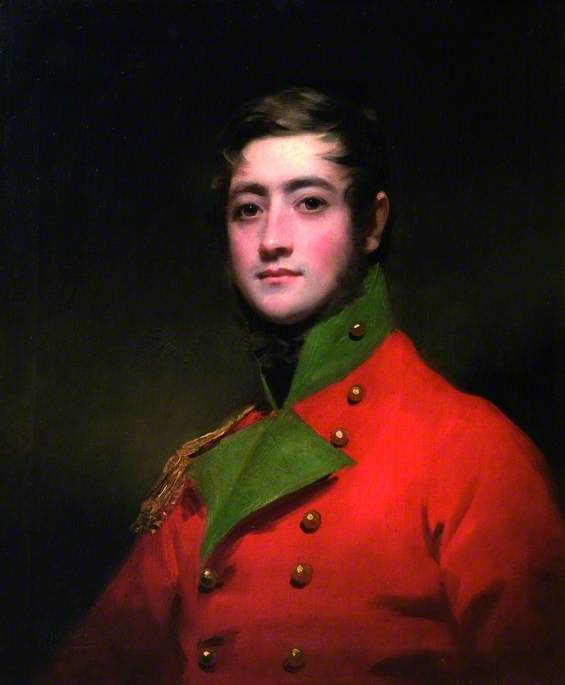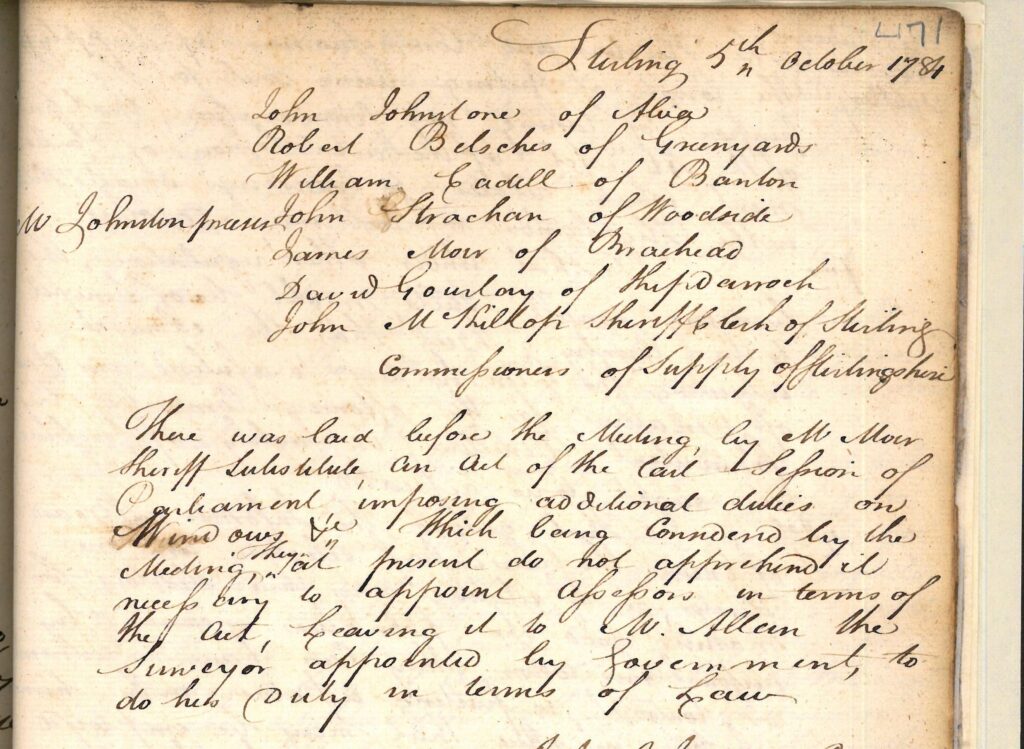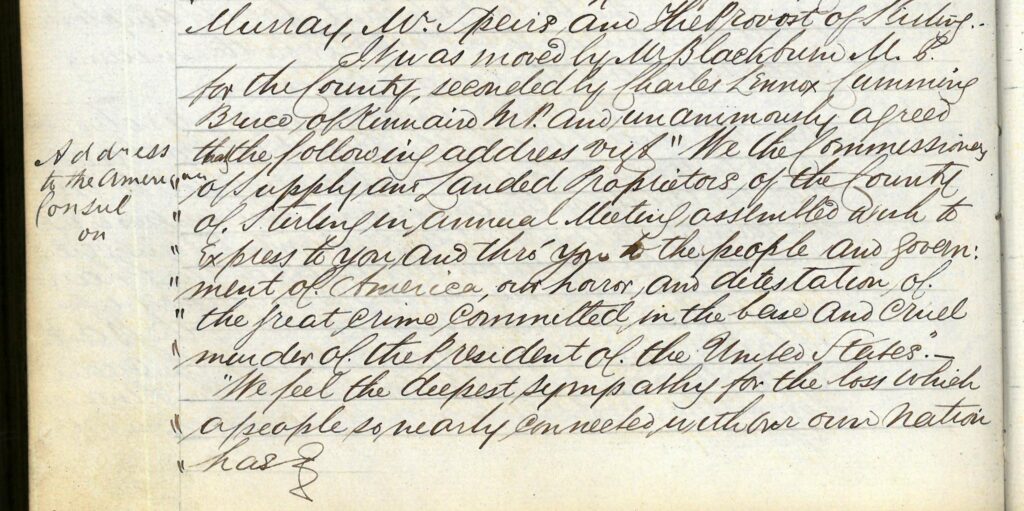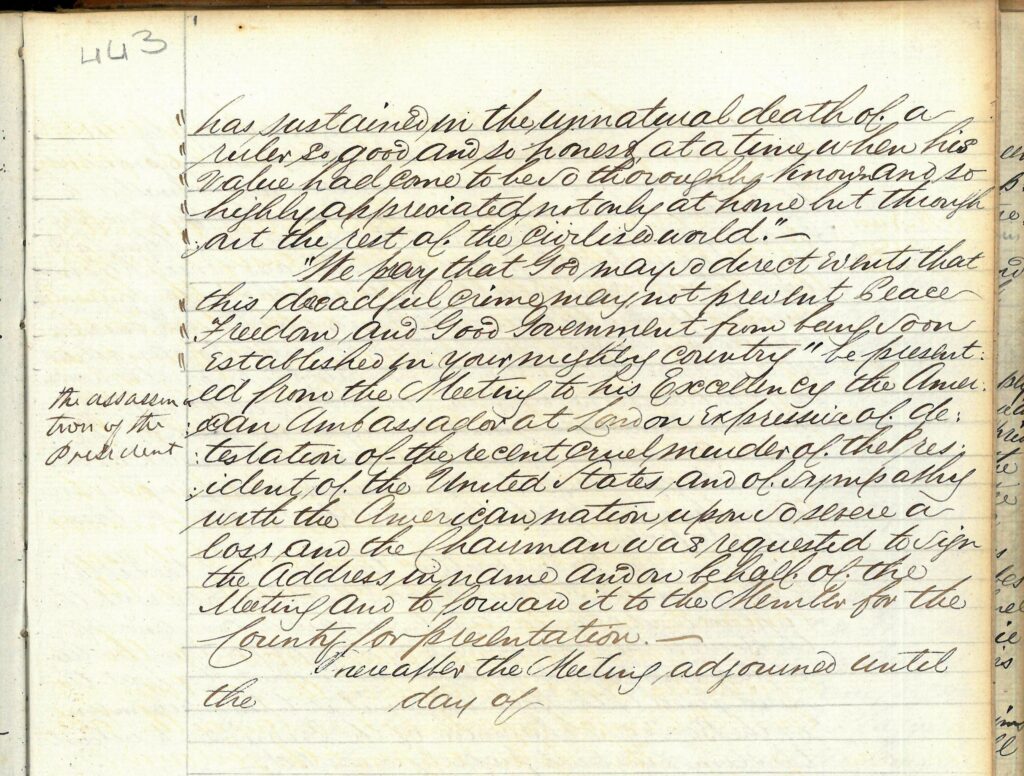Commissioners of Supply were first established in Scotland in 1667 to collect the cess, or national land tax, on a county basis. The Commissioners themselves were prominent landowners within their respective counties. After the Union in 1707, landowners possessing property, superiority, or liferent of lands with a minimum annual value of £100 Scots were eligible to be a Commissioner.
The 1667 ‘Act of the convention of estates of the kingdom of Scotland etc.’, records that the first Commissioners for Stirling Country were:
Alexander [Livingstone], Lord Almond; David [Erskine], Lord Cardross, [Alexander Elphinstone], Lord Elphinstone; James [Baillie], Lord Forrester; John Buchanan of that ilk, […]; Murray of Polmaise, Sir Alexander Hope of […]; Alexander Munro of Bearcrofts; Charles Erskine of Alva; […] Seaton of Touch; Sir Robert Elphinstone of Quarrel; Mr Andrew Oswald of Dalderse; and Sir Mungo Stirling of Glorat.
During the eighteenth century, the Commissioners collected various assessed taxes, including the unpopular window tax. They gradually acquired duties other than tax collection, although that remained their main function.
Along with the Justices of the Peace, they were responsible for county roads, bridges and ferries. Taxes could also be levied for county buildings, prisons and asylums. The Commissioners played an important role in local governance, ensuring that the views and concerns of landowners were heard.
A notable figure of the Stirling County Commissioners was Alexander Graham Spiers of Culcreuch, near Fintry. Born in 1793 and the son of Peter Speirs, the laird of Fintry, he was appointed Convener for Stirling County in 1857.
Alexander’s early life was a primarily spent with the military. After completing military college at Marlow, he entered the 39th Regiment of Foot as an ensign aged 16. He fought in the Peninsular War but was wounded in the Battle of Vittoria in 1813.

After marrying Miss Mary Buchanan Murray of Polmaise in 1828, he took over the estate after his father’s death in 1829. His attention turned to politics and in 1835 was elected as MP for Paisley but only served one year. After his appointment in 1857 as Convener of the Stirling County Commissioners, Alexander devoted the rest of his life to local governance, rarely missing the meetings of various Committees he convened.
Although it was primarily local matters the Commissioners discussed, international affairs were also deliberated. When news reached the Commissioners that the American President Abraham Lincoln had been assassinated in 1865, a reply to the American Consul was sent by Alexander offering their deepest sympathies:
“Sir: We, the Commissioners of Supply and landed proprietors of the county of Stirling, in annual meeting assembled, wish to express to you, and through you to the people and government of America, our horror and detestation of the great crime committed in the base and cruel murder of the President of the United States.
We feel the deepest sympathy for the loss which a people so nearly connected with our own nation has sustained in the unnatural death of a ruler so good and so honest, at a time when his value had come to be so thoroughly known and so highly appreciated, not only at home, but throughout the rest of the civilized world.
We pray that God may so direct events that this dreadful crime may not prevent peace, freedom and good government from being soon established in your mighty country.
Signed, in name and by appointment of the meeting, by Alexander Graham Speirs, of Culcreuch, convener of the county.
A. G. SPEIRS”
After taking ill at a meeting in April 1877, Alexander died shortly afterwards in August aged 87.


